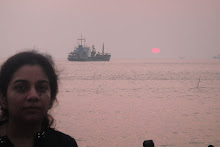It started with the realization, many years ago, that there weren't enough Indian books for children which told contemporary stories. So I thought it might be fun to try writing for children. So I wrote some stories and sent them off to a magazine and they liked them. So I decided to switch careers. I was in software before that.
Every book is satisfying in its own way, but the books Moin and the Monster and At Least a Fish were especially satisfying because they were completely mine, as opposed to my picture books, which have been collaborative. But collaborating with different illustrators has also been very exciting. To Market, to Market and Today Is My Day are two picture books that I really enjoyed working on.
2. Do you believe in writer's block and what is your way of deriving inspiration and getting fresh ideas for your books?
Ideas come from everywhere - things you see, hear, imagine, live.
As for writer's block, it's a mysterious phenomenon. When you stare at a blank screen and start typing random keys maniacally, you know it exists, whether you believe in it or not.
3. After having read many of your books, I feel the narrative amazingly captures the ramblings of a young mind, how do you transport yourself to feel and experience the emotions of children so aptly?
To be able to write for children, you have to be able to remember what it was like to be a child. They say about a lot of children's writers that they never grew up. I suspect that's true.
4. What are your next projects? When can we expect the next book in the series of Ana and Zian?
The next Zain and Ana (it's called Ghosts Don't Eat) has been written and illustrated and is expected to be out by September first week. The third Zain and Ana will be out next year, so I will be starting on it soon. There's also a picture book in verse that is in press. There are a couple of other books I want to write after I finish Zain and Ana 3.
5. Which kind of books excite Anushka? Which are your favourite authors ?
I love nonsense verse, especially Lewis Carroll and Edward Gorey. Also Dr Seuss who combines music and meaning so well, and Shel Siverstein's poetry for children. I like Roald Dahl because he thinks up the most bizarre stories. The other authors I like are Hilary MacKay, David Almond and Philip Pullman. I'm talking only about children's books here, of course.
The books in general that excite me vary with my moods, but I like reading books which have been thoroughly researched and are set in times and circumstances that I don't know much of. I also like books which have the Chekhovian quality of being light on the outside with a deep undertug of meaning and emotion.
6. Some people have natural flare for writing, in your opinion how much of this skill is acquired and how much is it a derivative of the basic nature of an individual?
I've found that one's writing improves when one keeps at it, so that seems to argue against the 'born writer' idea, but I think it might be like any skill - you can improve with practice, but to be really excellent, you probably need a gene for it.
7. How has the scenario changed in recent past in terms of kidlit in India?
There's been a quantum leap in the level of activity in children's literature. There are more publishers, creating more books, read by more children. But what we really need are more writers, because until we have a large number of writers, we're not going to have a high percentage of truly good books.
8. Any special incident or anecdote associated with a particular book that you would like to share with your readers?
9. Any suggestions to the budding authors aiming to write interesting children's books?
Read a lot, keep writing, and enjoy yourself. And never write down to a hypothetical child. Write for yourself, and the child who is like you will read and enjoy your writing.
10. Finally what are your feelings on having one of your books being shortlisted for Vodafone Crossword Book Awards? We wish you all the best!
It makes me happy of course, but most of all I'm happy that the Awards now include children's writing. As children's writers we're usually on the margins of the publishing world, but a prestigious award helps to give respectability, as it were, to the business of writing for children.













.png)








